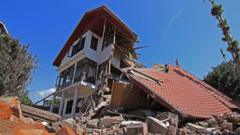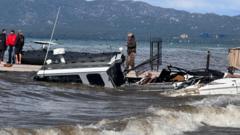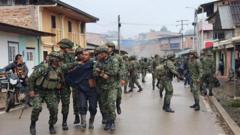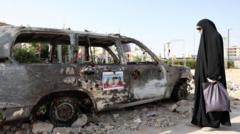Indian officials are actively pursuing leads in the wake of a brutal assault that led to the deaths of 26 people in Pahalgam. Explosives have been used to destroy the residences of accused militants, amplifying the ongoing tensions between India and Pakistan.
India Intensifies Search for Suspects After Pahalgam Attack

India Intensifies Search for Suspects After Pahalgam Attack
Authorities in Kashmir demolish homes of alleged militants in response to deadly tourist attack, escalating tensions in the region.
Authorities in Indian-administered Kashmir have stepped up their actions following a tragic attack on tourists in the Pahalgam region, marking one of the most lethal incidents in the area in two decades. In a bid to combat militancy, officials have demolished the homes of at least ten individuals identified as alleged militants, while also detaining numerous others for questioning.
The assault, which occurred last Tuesday, has prompted Indian security forces to assert that many of the demolished properties were linked to suspects implicated in the violence. Since the attack, over 1,500 people have been detained for questioning, as Indian officials strive to leave no stone unturned in their investigation efforts. This increased scrutiny has drawn criticism from local leaders, who caution against punishing families of suspects and call for a distinction between terrorists and innocent civilians.
The Indian government has accused Pakistan of aiding the militants involved in the attack, although no specific group has been officially named. Islamabad has vehemently denied these claims, stating that they are baseless and unfounded.
The recent violence has significantly heightened tensions in the region, which has long been a flashpoint for conflict between India and Pakistan. In the aftermath of the attack, military exchanges across the border have increased, with both nations accusing one another of provocation. Prime Minister Narendra Modi has vowed to bring those responsible to justice, adding to calls for a hardline stance against militant activities.
As investigations unfold, Indian police have named three of the four suspected attackers, revealing a mix of both local and foreign identities. The lack of clarity regarding the fourth suspect feeds the prevailing atmosphere of uncertainty. The wider implications of this attack have also caused distress within Kashmir’s communities, with students reporting threats from peers amid rising communal tensions.
In a recent development, the United States has engaged with both India and Pakistan, urging for peaceful easing of tensions and emphasizing the need for dialogue. As the situation continues to evolve, the world watches closely to see how it may impact international relations in South Asia.
The assault, which occurred last Tuesday, has prompted Indian security forces to assert that many of the demolished properties were linked to suspects implicated in the violence. Since the attack, over 1,500 people have been detained for questioning, as Indian officials strive to leave no stone unturned in their investigation efforts. This increased scrutiny has drawn criticism from local leaders, who caution against punishing families of suspects and call for a distinction between terrorists and innocent civilians.
The Indian government has accused Pakistan of aiding the militants involved in the attack, although no specific group has been officially named. Islamabad has vehemently denied these claims, stating that they are baseless and unfounded.
The recent violence has significantly heightened tensions in the region, which has long been a flashpoint for conflict between India and Pakistan. In the aftermath of the attack, military exchanges across the border have increased, with both nations accusing one another of provocation. Prime Minister Narendra Modi has vowed to bring those responsible to justice, adding to calls for a hardline stance against militant activities.
As investigations unfold, Indian police have named three of the four suspected attackers, revealing a mix of both local and foreign identities. The lack of clarity regarding the fourth suspect feeds the prevailing atmosphere of uncertainty. The wider implications of this attack have also caused distress within Kashmir’s communities, with students reporting threats from peers amid rising communal tensions.
In a recent development, the United States has engaged with both India and Pakistan, urging for peaceful easing of tensions and emphasizing the need for dialogue. As the situation continues to evolve, the world watches closely to see how it may impact international relations in South Asia.




















